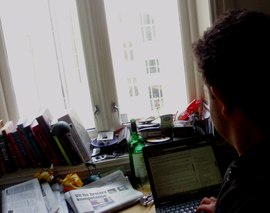The connections between anthropologists, military counterinsurgency experts and intelligence agencies are multiplying and deepening. It is well known that anthropologists work for the military. But government agencies may be only the tip of the iceberg. Contractors to the military are probably employing many more anthropologists as the privatization of the military grows apace, Roberto J. González writes in Anthropology Today June 2007 (to be published in a couple of weeks).
I quote his “small sample of military contractors currently recruiting anthropologists to service military operations”:
1. BAE Systems is advertising a ‘field anthropologist’ position for deployment to Iraq and Afghanistan for what appears to be counterinsurgency support work. The job is ‘designed to dramatically improve the collection, interpretation, understanding, operational application, and sharing of local cultural knowledge… [it] facilitates the collection, analysis, archiving and application of cultural information relevant to the unit commander’s operational decision-making process.’
2. Hicks & Associates (a subsidiary of the multinational Science Applications International Corporation) is advertising a ‘research assistant’ position for a project that ‘investigates the evolution of subnational identities within and across states, and the implication of culture on attitudinal perspectives of other groups… [in] Tunisia and other North African nations… the position requires a background in anthropology… Arabic language skills are a plus.’
3. L-3 Communications is advertising a position for ‘cultural expert – Middle East’. Duties include ‘technical intelligence data gathering and analysis skills and abilities to manage, develop, implement, and administer intelligence analysis programs and policies for customer applications’. Candidate ‘MUST be fluent in Arabic, Pashtu, or Persian-Farsi… MUST have knowledge of prevalent Sunni and Shia tribes in the Middle East… US Citizens applying must hold PhD in History or Anthropology’.
4. Military Professional Resources Incorporated (MPRI) is advertising a ‘COIN operations specialist’ position in order to ‘provide Brigade Combat Team or Regiment, battalion and company-level leaders of Coalition units and brigade and battalion-level leaders of Transition Teams (MiTT/NPTT/BTT) and the Iraqi Security Forces (Iraqi Army and Iraqi National Police) with a fundamental understanding of COIN principles, lessons learned and TTPs required to execute full-spectrum operations in the Iraqi Theater of Operations… a Master’s Degree in Military Science, Psychology, Cultural Anthropology’ is preferred and military experience is a requirement.
5. Booz Allen Hamilton is advertising a position for a ‘war on terrorism analyst’ who will conduct ‘research into adversary and target country elements of power, including political, military, economic, social, infrastructure, and information (PMESII) systems to assist military planners… conduct evaluations of terrorist adversary and target country response to effects based activities… [and] work with joint military planners and the inter-agency community to determine planning options to achieve War on Terrorism efforts and objectives’. Qualifications include a BA or BS degree, with ‘knowledge of political science, economics, social anthropology, infrastructure, or information operations preferred’.
6. The Mitre Corporation is advertising a ‘sr. artificial intelligence engineer’ position ‘to play a role in applying modeling and simulation as an experimental approach to social and behavioral science problems of national significance… [and] to apply social sciences to critical national security issues.’ Desirable applicants will have a ‘PhD in a social science discipline (e.g. anthropology, sociology, sociolinguistics, medical anthropology, cultural geography, comparative social and cognitive psychology, cultural communication studies, science/technology studies, international labor/industrial relations, industrial/organizational psychology, comparative political science, public administration.)’
UPDATE:
Protests against British research council: “Recruits anthropologists for spying on muslims”
Summary of another article in Anthropology Today June 2007: >> The dangerous militarisation of anthropology
SEE ALSO:
“Tribal Iraq Society” – Anthropologists engaged for US war in Iraq
Anthropologist Mahmood Mamdani: “Peace cannot be built on humanitarian intervention”
Embedded anthropology? Anthropologist studies Canadian soldiers in the field
Fieldwork reveals: Bush administration is lying about the “war on terror” in the Sahara
San Jose: American Anthropologists Stand Up Against Torture and the Occupation of Iraq and AAA Press Release: Anthropologists weigh in on Iraq, torture at annual meeting
“War on terror”: CIA sponsers anthropologists to gather sensitive information / see also debate on this on Savage Minds
Anthropology and Counterinsurgency: The Strange Story of Their Curious Relations
Bush, “war of terror” and the erosion of free academic speech: Challenges for anthropology
USA: Censorship threatens fieldwork – A call for resistance
Two Books Explore the Sins of Anthropologists Past and Present
The connections between anthropologists, military counterinsurgency experts and intelligence agencies are multiplying and deepening. It is well known that anthropologists work for the military. But government agencies may be only the tip of the iceberg. Contractors to the military are…


 It’s a privilege to be an anthropologist on fieldwork. Reading
It’s a privilege to be an anthropologist on fieldwork. Reading